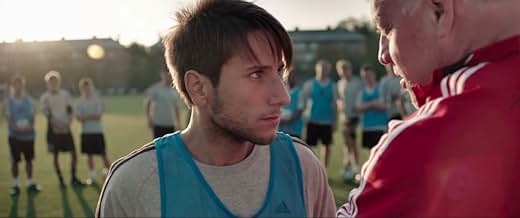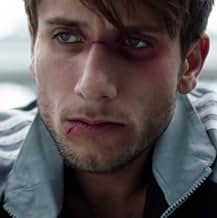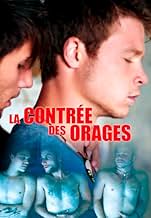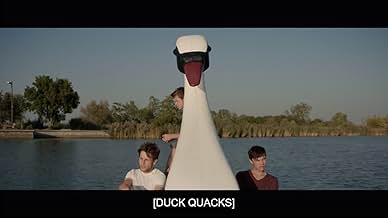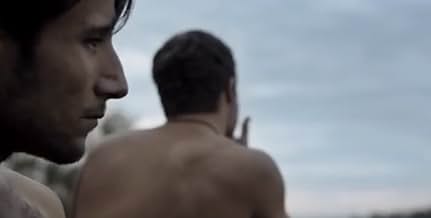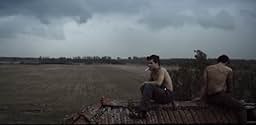Szabolcs deja el fútbol contra la voluntad de su padre y regresa a su país, Hungría, para hacerse cargo de una herencia de su abuelo. Allí conoce a Aron y ambos exploran sus identidades.Szabolcs deja el fútbol contra la voluntad de su padre y regresa a su país, Hungría, para hacerse cargo de una herencia de su abuelo. Allí conoce a Aron y ambos exploran sus identidades.Szabolcs deja el fútbol contra la voluntad de su padre y regresa a su país, Hungría, para hacerse cargo de una herencia de su abuelo. Allí conoce a Aron y ambos exploran sus identidades.
- Premios
- 1 premio ganado y 9 nominaciones en total
Dániel Szerémy
- Boy in the Village 3
- (as Dániel Szerémy)
- Dirección
- Guionistas
- Todo el elenco y el equipo
- Producción, taquilla y más en IMDbPro
Opiniones destacadas
The fact that it's based on a true story shows in the authenticity of the film and a storyline that doesn't fit a straight line narrative and Andras Suto's performance is so strong and the process of discovery is tangible. The emotional depth of the film is less about discovery of sexuality and more about discoveries of oneself and how shame and pressure to conform also clouds the discovery process. That is the best part of the film, it's not about sex, but about what sexuality is and if the characters can embrace that especially given the circumstances. The ending of the film feels abrupt, but the story is far from a conclusion. That's what makes it really satisfying because it leaves self discovery to continue and sometimes it's a long journey of hatred and shame and maybe you never figure it out. It's a powerful story with great performances.
Two boys are talented football players in Germany Szabolcs is from Hungary and his best friend Bernard is German. Then after a particularly unfruitful game, Szabolc decides to return to Hungary and live in the broke down farm that he inherited from his grandfather.
Whilst he had rejected his homosexual urges in Germany - once he gets home he meets Áron and for him it is a game changer. The thing is it is also a game changer for the whole community. To say any more may be veering in to plot spoiler territory. Needless to say there are depictions of homophobia here. Some may say that we have seen it all before, but films like this need to be made to address the still pervading attitudes in many countries and communities towards LGBT people.
Filmed in Hungarian, German and a tad of English with good sub titles. This is done using an original story line, a group of talented actors and a lot of warmth. The decisions that some of the characters make may be questionable, but I am pretty safe in saying that we all have made mistakes in our lives. I found this to be engrossing, sensual - in parts - and ultimately moving; this is for lovers of gay cinema in all its parts.
Whilst he had rejected his homosexual urges in Germany - once he gets home he meets Áron and for him it is a game changer. The thing is it is also a game changer for the whole community. To say any more may be veering in to plot spoiler territory. Needless to say there are depictions of homophobia here. Some may say that we have seen it all before, but films like this need to be made to address the still pervading attitudes in many countries and communities towards LGBT people.
Filmed in Hungarian, German and a tad of English with good sub titles. This is done using an original story line, a group of talented actors and a lot of warmth. The decisions that some of the characters make may be questionable, but I am pretty safe in saying that we all have made mistakes in our lives. I found this to be engrossing, sensual - in parts - and ultimately moving; this is for lovers of gay cinema in all its parts.
Szabolcs (András Sütö) plays in a German football team, as does Bernard (Sebastian Urzendowsky). A lost match and an ugly confrontation leads Szabolcs to reconsider his life. He goes back to Hungary for simplicity & to build up an inherited broke down house and to bask in his newly found solitude. He meets Aron, a local who welcomes him by stealing his motorcycle. In a odd turn of events, Szabolc hires Aron (Ádám Varga) to help him rebuild his property. A mutual attraction develops to the detriment of Szabolcs, as Aron's mother and local mates disapprove of their relationship. Violence ensues for both. A sexual friendship of the same sex attraction breeds contempt with the towns people, as Aron's dependent mother denounces her son's lifestyle to the local bullies in an attempt to "correct" his behavior. A confused yet curious Aron expresses his affection for Szabolc with a mix bag of emotions and several eruptive confrontations that will ultimately lead to a very shocking and disturbing finale.
This Hungarian/German co-production may very well be reflective, and a testament of the the state of affairs and societal hostilities that still remain in place in a few rural towns within eastern Europe where the enabling, persecution & disdain for same sex couples seems to remain latent. This mentality shepherded by religious intolerance is what leads the violence and the hostile living conditions for anyone not subscribed to the few who have self appointed themselves as the enforcers of the town's moral code of conduct.
Hungarian director Adam Csaczi's unveiling of the story with its sweeping cinematography, superb direction and acting is poetic, lyrical and subtly mesmerizing.
This Hungarian/German co-production may very well be reflective, and a testament of the the state of affairs and societal hostilities that still remain in place in a few rural towns within eastern Europe where the enabling, persecution & disdain for same sex couples seems to remain latent. This mentality shepherded by religious intolerance is what leads the violence and the hostile living conditions for anyone not subscribed to the few who have self appointed themselves as the enforcers of the town's moral code of conduct.
Hungarian director Adam Csaczi's unveiling of the story with its sweeping cinematography, superb direction and acting is poetic, lyrical and subtly mesmerizing.
What the hell? I would've considered giving it a full 10 stars. There are some beautiful shots and sequences and even though it can be a little hard to watch at times, it's a very good film, until the last 100 seconds. I have no idea what the director's and writer's point was? The last 100 seconds need to be erased or something. I was having a great time and now I'm heavily disgusted. If you're planning on watching this, stop watching when 5:05 is left (with credits) or 1:45 is left (without credits) because really, the film ends there. Whatever it was after that, it was inhuman and disturbing and most of all, pointless.
the basic sin of this film could be the well known story. the virtue - the nuances of this well known story. because, against the similarities with Brockeback Mountain, the comparison with many other films about the same theme, it is a film who has its individuality. the fragile success in Germany, the links with the past, the new life and the secret who becomes obvious, the reaction of community to a fundamental sin, the symbols - the old house as one of the most powerful -, the bitter poetry are small but significant pieces who transforms an ordinary story about homophobia in a special pledge for tolerance. and this is the important thing. the silence, the relations, the victim, the image of happiness and error. so, a film who can not be reduced at the basic theme. and this is the great thing - to present, using the right tone, a forbidden love story. the rest is silence.
¿Sabías que…?
- TriviaAccording to writer-director Ádám Császi, the film is based on a true story.
Selecciones populares
Inicia sesión para calificar y agrega a la lista de videos para obtener recomendaciones personalizadas
- How long is Land of Storms?Con tecnología de Alexa
Detalles
Taquilla
- Presupuesto
- HUF 120,000,000 (estimado)
- Total a nivel mundial
- USD 3,241
- Tiempo de ejecución1 hora 45 minutos
- Color
- Relación de aspecto
- 2.35 : 1
Contribuir a esta página
Sugiere una edición o agrega el contenido que falta


